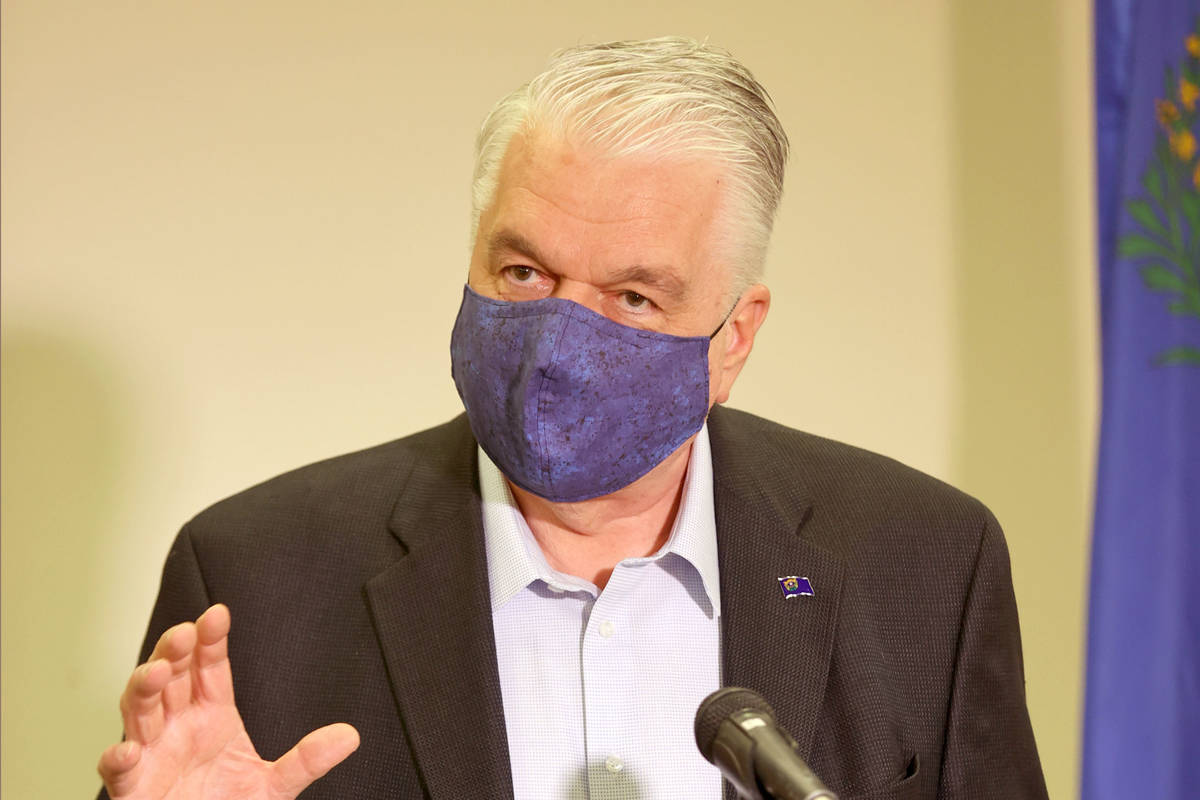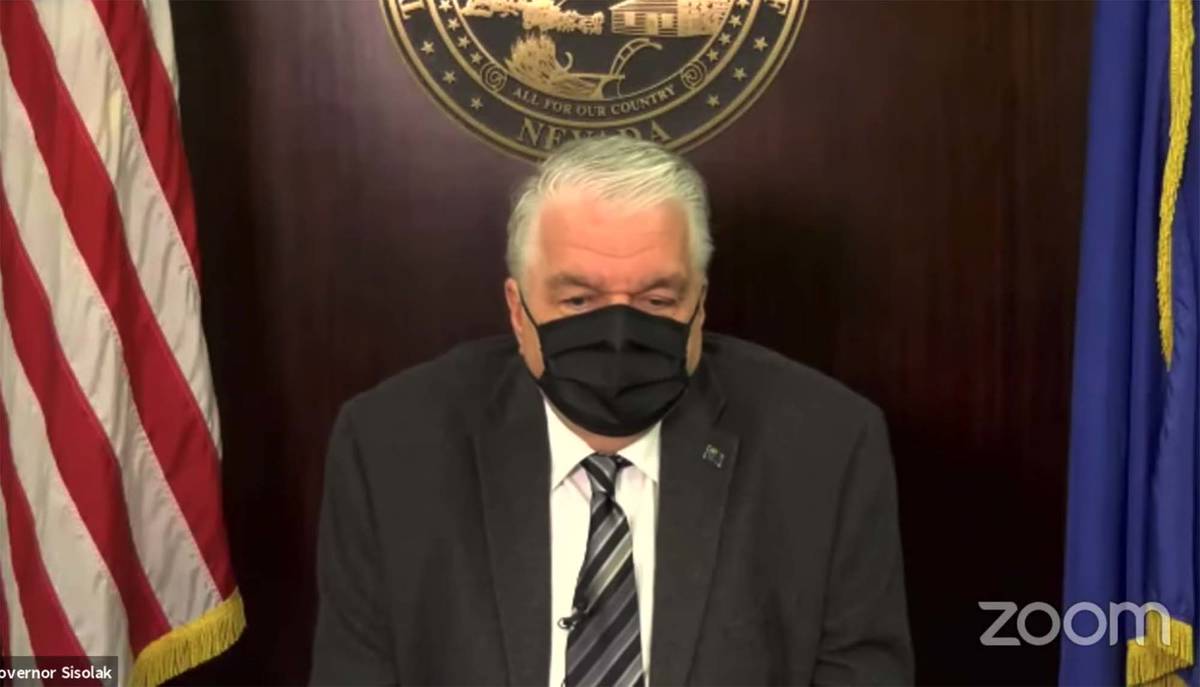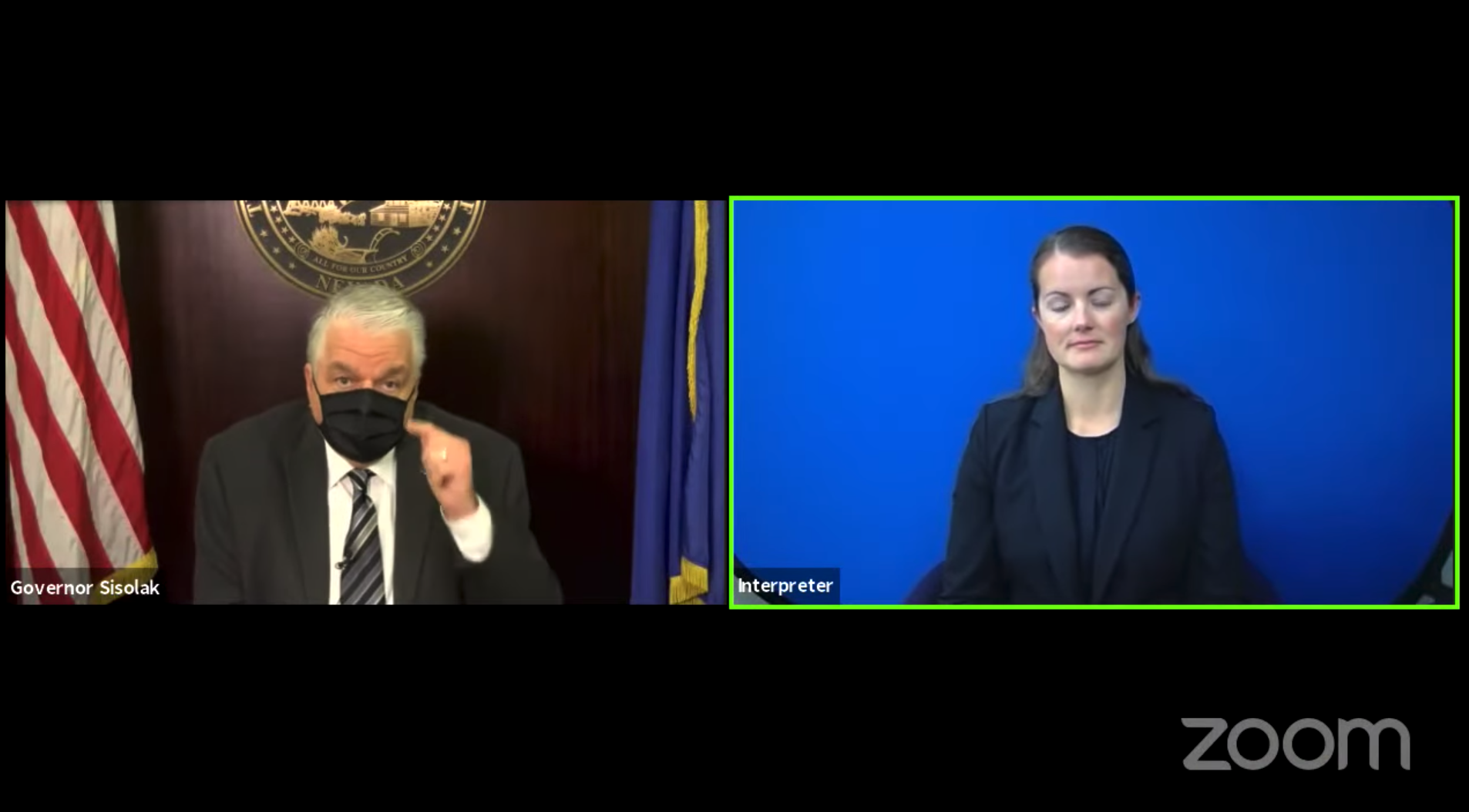Sisolak extends Nevada pandemic ‘pause’
With Nevada experiencing its deadliest stretch yet of the COVID-19 pandemic, Gov. Steve Sisolak announced Sunday that the “statewide pause” put in place to slow the rapid spread of the virus will be extended into January and that a moratorium on most residential evictions will be reinstated.
The statewide pause, which was announced Nov. 22 as a three-week plan and was set to expire Tuesday, includes stricter mask requirements and smaller capacities at restaurants, bars, casinos, gyms, bowling alleys and other areas of recreation or entertainment. It will be extended until Jan. 15, Sisolak said.
“I know the mitigation restrictions in place under the current ‘pause’ are devastating to many Nevadans who just want to go back to ‘normal,’ who are worried about their jobs, their businesses, keeping their homes and getting their kids back to school,” Sisolak said. “But as I’ve said for nine months now, we must do what we can to protect the health and safety of the public. That remains more important than ever as we experience these record numbers.”
The restrictions implemented under the pause also reduced the gathering limit from 250 to 50 or 25 percent capacity, whichever number is lower, and capped private gatherings at 10 people “from no more than two households.”
While restrictions are being extended, the only new mitigation measure announced by Sisolak on Sunday was the eviction moratorium, which will go into place at 12:01 a.m. on Tuesday and last until March 31. It will help keep people in their homes rather than out looking for jobs or other housing, where they may unintentionally spread the virus, Sisolak said.
Nevada’s new moratorium will apply to tenants who can’t pay their rent but will not bar all evictions. Exceptions include lease breaches, unlawful activity and nuisance issues.
The announcement comes as a federal moratorium on residential evictions is set to expire at the end of the month and as the deadline to use federal assistance funds approaches. Sisolak said local officials have also expressed concerns about a surge of a new families at shelters.
“This is a reality we cannot afford to risk at this time,” Sisolak said. “During this current surge we are experiencing, it’s critical that we do all we can to keep Nevadans in their homes and mitigate the risk and spread and infection.”
In the three weeks since Sisolak announced the pause, the state has experienced one of its worst surges of COVID-19, setting new daily and weekly death totals and, as of Friday, having the highest rate of hospitalized COVID-19 patients per capita of any state in the U.S.
While rural and northern parts of Nevada are starting to see slight declines in hospitalization rates, Sisolak said state health officials don’t think that Southern Nevada, where the majority of the state’s population lives, has hit its peak.
Sisolak said the state will continue to monitor the metrics but suggested that he could be forced to adopt tougher restrictions if officials and experts believe that the state is beyond its capacity to respond.
Sunday’s news conference was one of the most extensive briefings Sisolak has given during the pandemic. He addressed the current surge, upcoming vaccinations for the virus, the lack of action on federal relief from Congress and even criticism of his own measures.
Sisolak has been criticized both for being too restrictive in his mitigation measures and for not being strict enough to meaningfully mitigate the spread of the virus, specifically in allowing casinos and gaming properties to remain open and effectively inviting people from out of state to travel to Nevada while begging Nevadans to stay home as much as possible.
Sisolak said his decision to keep casinos open is driven by what the state experienced in the spring during the shutdown, when some 250,000 Nevadans lost their jobs.
“When I think of the gaming industry, I am not losing sleep at night because I’m worried about their stock prices or whether gaming executives are going to make it through the pandemic and be able to keep a roof over their heads,” Sisolak said.
But the governor noted just how reliant Nevada is on gaming revenue to fund essential services like education and health care, saying the hit to the state’s coffers from gaming revenues from another shutdown would amount to $52 million per month.
“A shutdown is unrealistic without additional support,” he said. “And I realize I owe it to all those Nevadans who may be monitoring our COVID trends right now and wondering why I don’t move in that direction.”
Representatives of the gaming and tourism industries were generally supportive of the governor’s directive.
“The health and safety of our guests, visitors and fellow residents remain the resort industry’s highest priority,” said Virginia Valentine, president and CEO of the Nevada Resort Association.
Valentine said that the association understands the difficult situation and that it appreciates the governor’s “balanced” approach in making this decision.
A spokesman for MGM Resorts International said that the company plans to follow all of the governor’s guidelines and will cancel all live entertainment shows through Jan. 15.
But analysts covering the industry weren’t as complimentary and suggested that Sisolak’s restrictions will only slow the state’s economic recovery.
“The governor’s comments continued to be a mixed bag for the gaming industry that thankfully did not see any further restrictions put in place but did have their capacity constraints continue for another 30 days,” said Brendan Bussmann, director of government affairs for Las Vegas-based Global Market Advisors.
Other business leaders across the state had mixed views.
“A lot of our businesses are at 25 percent right now, which means they’re running thin, and it’s definitely a challenge,” said Ken Evans, president of the Urban Chamber of Commerce. “At the same time, for some of them, it keeps them open. And in the case of those that are doing food and beverage and have the ability to do carry-out or takeout, it at least keeps them open to do that and generate some revenue that way. We’re trying to, as safely as possible, avoid a total shutdown.”
Las Vegas Mayor Carolyn Goodman said that though she would like the state to lift restrictions, she was glad to hear that the governor wasn’t adding new ones.
“The busiest time of year for businesses is always the holidays, so this 25 percent capacity limit is going to hit hard,” she said. “You cannot do anything in life operating at a quarter, whether it’s a quarter effort, a quarter glass of water or a quarter glass of food. It’s devastating.”
Contact Capital Bureau Chief Colton Lochhead at clochhead @reviewjournal.com. Follow @ColtonLochhead on Twitter. Review-Journal staff writers Richard N. Velotta and Alexis Ford contributed to this report.




















































